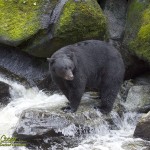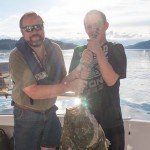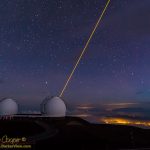Among the tribes of the coastal northwest there is a ceremony that surrounds the first fish of the season. These ceremonies might vary from tribe to tribe, from family to family, but every tribe had such a ceremony.
Life once depended on the yearly return of salmon to the rivers and streams each summer. For bears, eagles, and humans the annual bounty of salmon provided the nourishment that would see them through the long winter. The forest itself benefits from the nutrients carried from distant seas into the trees where the salmon would spawn and die.
Upon catching the first salmon of the season the tribe will stop and celebrate. They celebrate the life of the fish, they celebrate the cycles of the natural world, they celebrate their connection with nature. Some protocols insist that the first fish be released, to continue upriver to spawn, to ensure the salmon continue to return each summer.
That one idea is the critical bit, our connection with nature. Any fisherman understands that he takes from the natural world. A good fisherman stops and considers what he takes. He takes only what he needs to feed his family. This is the entire point of the first fish ceremony, it serves to educate the community in the act of taking, to limit what you take to what the environment can provide.
I grew up in a hunting and fishing family, where a considerable portion of our food came from what my father caught or shot. Be it elk, deer, ducks, razor clams, or smelt, so many of my childhood memories center around the capture, preparation and storage of food… Chopping, packaging and freezing an elk was a serious amount of labor for the entire family.
Our family does not hunt much anymore, but we still fish. A fishing trip resulting in a cooler load of frozen salmon and halibut is a standard part of every summer and results in so many meals. As I write this I can still taste tonight’s dinner of pan fried halibut and local island mushrooms.
I have never participated in a proper first fish ceremony involving the entire tribe. For me it is more personal than that. I have often given thanks to my prey for what I have taken. Often the family will gather on the back deck for our first catch, to reflect and give thanks for what we do. As my ancestors before me I understand that I take, and that we do so as an unbroken continuation of a long tradition.
Do we take from nature? Of course, in merely living we impact the natural world. Be it a wild caught king salmon, a gallon of gasoline, a bag of corn chips. There is a price for everything we consume. The land ploughed for farming, the highway cut across the land, the electrical power used to cool the display case.
You can make the fair observation that too many in our society have lost sight of this. What they take from the natural world is done by others, to be found neatly packaged and bloodless on a supermarket shelf. Too many do not understand the price of their continued existence and as a result have an unrealistic view of our relationship with the natural world.
It is those who hunt, fish, or farm that have a direct view into how we take from the natural world around us to support our existence. The act of killing an animal is often visceral and bloody. When you look into the eyes of your catch you know. If you have any connection with the natural world you understand what you have done, and the ceremonies that surround the first fish are completely understandable.
Some people think we can put nature behind a fence and not touch it. Perhaps we can, and probably should for areas of special significance. Other places we choose to use, to fish, to farm, to build our homes. The question is where and when, and under what restrictions. This is the discussion, the argument that defines the world we live in today. It is important that when you make this argument you understand our relationship with the world. We must extract from nature to survive, to grow, we must preserve for the same reasons.
The current version of this argument that consumes our island it the continued use of the summit of Mauna Kea for astronomy. Opponents of the telescopes atop Mauna Kea often accuse supporters of not understanding, of damaging nature, of not caring.
They are wrong.
We know exactly what we do. For us the choice is much the same as taking a fish for survival. It is also much more… We understand that mere survival is not enough. Finding answers to the great questions is important. We are not satisfied with the old legends and myths that purported to explain the universe. We want the real answers… How did it all begin? Are we alone in the universe? What will happen in the end?
Knowing that we take from the natural world we proceed carefully, with environmental impact statements, careful design of the facilities, mitigating actions, of continued vigilance to insure we take no more than necessary. Does the mere knowledge that we take from nature stop us? No. We weigh the costs against what is to gain.
Take a few fish and live to see another summer when the fish run again. Cut a few great koa trees to build the waʻa to explore a vast ocean. Build a telescope atop the mauna to learn the answers. In the eyes of the explorer the answer is clear, build a telescope to see the sky more clearly. What we gain is enormous, the cost is sustainable and can be mitigated, can be restored one day when the telescope is decommissioned.
We follow in the footsteps of our ancestors, continuing a tradition that is unbroken since the first human ancestor strode north out of Africa, looking to the stars above to find their way. Their descendants would use the stars to cross oceans and discover lands far beyond the horizon. Now we build telescopes to see beyond the sky, to continue the voyage of exploration. Our connection to nature is strengthened by better understanding of the universe. We learn how special our world is.
Be it first light or the first fish… We celebrate nature, we celebrate exploration and learning, we celebrate life.






Nicely said, son. Mom
Nice post, Andrew. Enjoyed reading your perspective.